Use a variable "returnValue", eg:
var returnValue = xlRange.Cells[xCell, yCell].Value2.ToString();
xlApp.ThisWorkbook.Close();
xlApp.Quit();
return returnValue;
Update
The error code indicates one of these is the cause:
# as an HRESULT: Severity: FAILURE (1), Facility: 0xa, Code 0x3ec
# for hex 0x3ec / decimal 1004 :
INVALID_RESOURCETYPE_LOOKSALIVE clusvmsg.h
JET_wrnColumnNull esent98.h
# /* Column is NULL-valued */
NMERR_BLOB_ENTRY_DOES_NOT_EXIST netmon.h
SQL_1004_severity_16 sql_err
# Invalid column prefix '%.*ls': No table name specified
SCEEVENT_ERROR_POLICY_QUEUE uevents.mc
# Notification of policy change from LSA/SAM failed to be
# added to policy queue.
# %1
ERROR_INVALID_FLAGS winerror.h
# Invalid flags.
EVENT_MAN_PROFILE_NO_FILE_ACCESS wlevents.mc
# The user %1 does not have access to the mandatory profile
# located at %2.
EVENT_UAE_VERIFICATION_FAILURE wlevents2.mc
# Verification of an automatically enrolled certificate has
# failed. (%1) %2
WPA_MUST_ACTIVATE_NOW_EVENT wpaevent.mc
# This copy of Windows must be activated with Microsoft
# before you can continue. To activate Windows, please
# contact a customer service representative.
# 9 matches found for "0x800A03EC"
Perhaps your xCell, yCell's aren't in the UsedRange. Can you step through the code "Debug it" and post a screenshot that matches the scenario you're encountering? Thanks.
Solution
What you're encountering is explained here: How do I properly clean up Excel interop objects?
To over come it you can use AutoReleaseComObject or the original VSTO-Contrib. Here is some code to show you how to use it:
using Microsoft.Office.Interop.Excel;
using System.Runtime.InteropServices;
namespace ExcelInterop
{
public partial class Form1 : Form
{
public Form1()
{
InitializeComponent();
}
Microsoft.Office.Interop.Excel.Application excelApp;
private void button1_Click(object sender, EventArgs e)
{
string path = @"C:\temp\Logfile.CSV";
int sheetNum = 1;
string returnValue = string.Empty;
var missing = Type.Missing;
int xCell = 1, yCell = 1;
using (AutoReleaseComObject<Microsoft.Office.Interop.Excel.Application> excelRCWWrapper = new AutoReleaseComObject<Microsoft.Office.Interop.Excel.Application>(new Microsoft.Office.Interop.Excel.Application()))
{
var excelApp = excelRCWWrapper.ComObject;
var excelAppWkBooks = excelApp.Workbooks;
try
{
using (AutoReleaseComObject<Workbook> excelAppWkBk = new AutoReleaseComObject<Workbook>(excelAppWkBooks.Open(path, false, false, missing, missing, missing, true, missing, missing, true, missing, missing, missing, missing, missing)))
{
var workbookComObject = excelAppWkBk.ComObject;
Worksheet sheetSource = workbookComObject.Sheets[sheetNum];
using (AutoReleaseComObject< Range> excelAppRange = new AutoReleaseComObject<Range>(sheetSource.UsedRange))
{
returnValue = excelAppRange.ComObject.Cells[xCell, yCell].Value2.ToString();
}
ReleaseObject(sheetSource);
workbookComObject.Close(false);
}
}
finally
{
excelAppWkBooks.Close();
ReleaseObject(excelAppWkBooks);
excelRCWWrapper.ComObject.Application.Quit();
excelRCWWrapper.ComObject.Quit();
ReleaseObject(excelRCWWrapper.ComObject.Application);
ReleaseObject(excelRCWWrapper.ComObject);
GC.Collect();
GC.WaitForPendingFinalizers();
GC.Collect();
}
}
}
private static void ReleaseObject(object obj)
{
try
{
while (System.Runtime.InteropServices.Marshal.ReleaseComObject(obj) > 0) ;
obj = null;
}
catch (Exception ex)
{
obj = null;
Console.WriteLine("Unable to release the Object " + ex.ToString());
}
}
}
}
Here is the AutoReleaseComObject class:
using System;
using System.Collections.Generic;
using System.Linq;
using System.Text;
using System.Diagnostics;
namespace ExcelInterop
{
public class AutoReleaseComObject<T> : IDisposable
{
private T m_comObject;
private bool m_armed = true;
private bool m_disposed = false;
public AutoReleaseComObject(T comObject)
{
Debug.Assert(comObject != null);
m_comObject = comObject;
}
#if DEBUG
~AutoReleaseComObject()
{
// We should have been disposed using Dispose().
Debug.WriteLine("Finalize being called, should have been disposed");
if (this.ComObject != null)
{
Debug.WriteLine(string.Format("ComObject was not null:{0}, name:{1}.", this.ComObject, this.ComObjectName));
}
//Debug.Assert(false);
}
#endif
public T ComObject
{
get
{
Debug.Assert(!m_disposed);
return m_comObject;
}
}
private string ComObjectName
{
get
{
if (this.ComObject is Microsoft.Office.Interop.Excel.Workbook)
{
return ((Microsoft.Office.Interop.Excel.Workbook)this.ComObject).Name;
}
return null;
}
}
public void Disarm()
{
Debug.Assert(!m_disposed);
m_armed = false;
}
#region IDisposable Members
public void Dispose()
{
Dispose(true);
#if DEBUG
GC.SuppressFinalize(this);
#endif
}
#endregion
protected virtual void Dispose(bool disposing)
{
if (!m_disposed)
{
if (m_armed)
{
int refcnt = 0;
do
{
refcnt = System.Runtime.InteropServices.Marshal.ReleaseComObject(m_comObject);
} while (refcnt > 0);
m_comObject = default(T);
}
m_disposed = true;
}
}
}
}
Here is a screenshot showing you I got it working!!

